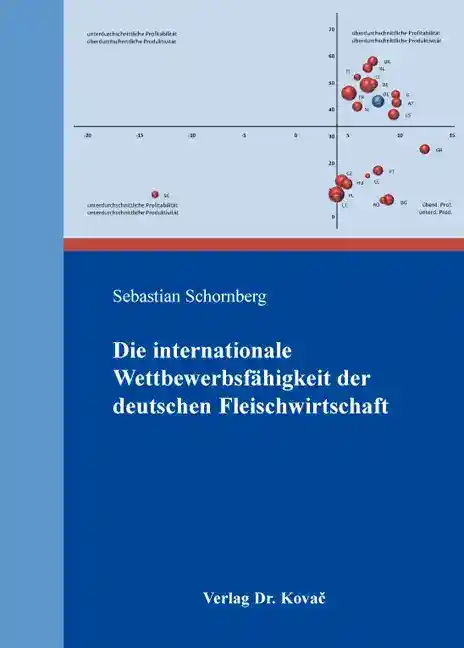Sebastian SchornbergDie internationale Wettbewerbsfähigkeit der deutschen Fleischwirtschaft
Schriftenreihe agrarwissenschaftliche Forschungsergebnisse, volume 48
Hamburg 2013, 348 pages
ISBN 978-3-8300-7529-5 (print) |ISBN 978-3-339-07529-1 (eBook)
About this book deutschenglish
As a part of the German agro-food business and while generating a great part of its turnover, the meat sector is important. For decision makers in companies, politics and science, the interest in its competitiveness rises. Mainly, this is the result of stagnating meat consumption in Germany and thus more attractive foreign markets, increasing competition through foreign supplies on the German meat market and the expected more and more liberalised worldwide meat markets. Considering this situation, this work aims to analyse the international competitiveness of the German meat sector. While the German meat companies still export the biggest share of their production to other EU-countries, e.g. Brasilia and China are getting even more big players on the international meat markets. Theoretical approaches of competiveness exist on different aggregation levels (macro, meso and micro). Each one explains competitiveness on a sector level in part. However, the fact that no single theory is able to explain competitiveness on a sector level comprehensively illustrates the need for a specific “systemic view”. This view leads to conclusions and thus possibilities of measuring competitiveness. Methodologically, the analysis relies on three different competitiveness approaches: a comparison of the EU-27 by using eurostat data, a comparison of the EU-27 with the aid of AMADEUS data and an international comparison of worldwide meat sectors based on trade data. Despite the different analysis periods, sample sizes and sector definitions the results came out as expected. In summary, the US leads the ranking before the South American countries Argentina and Uruguay. In the final ranking of 46 countries, Germany comes on the 11th place. In the future, Germany’s competitiveness may depend on possible changes in laws concerning temporary workers, how the concentration of the German meat industry continues or how debates about animal-friendly farming methods and the ethics of meat consumptions develop.Keywords
AgrarökonomieAgrarwissenschaftArgentinienDeutschlandErnährungswirtschaftFleischwirtschaftKennzahlenProduktivitätProfitabilitätSektoranalyseUruguayUSAWettbewerbsfähigkeitIhr Werk im Verlag Dr. Kovač

Möchten Sie Ihre wissenschaftliche Arbeit publizieren? Erfahren Sie mehr über unsere günstigen Konditionen und unseren Service für Autorinnen und Autoren.
